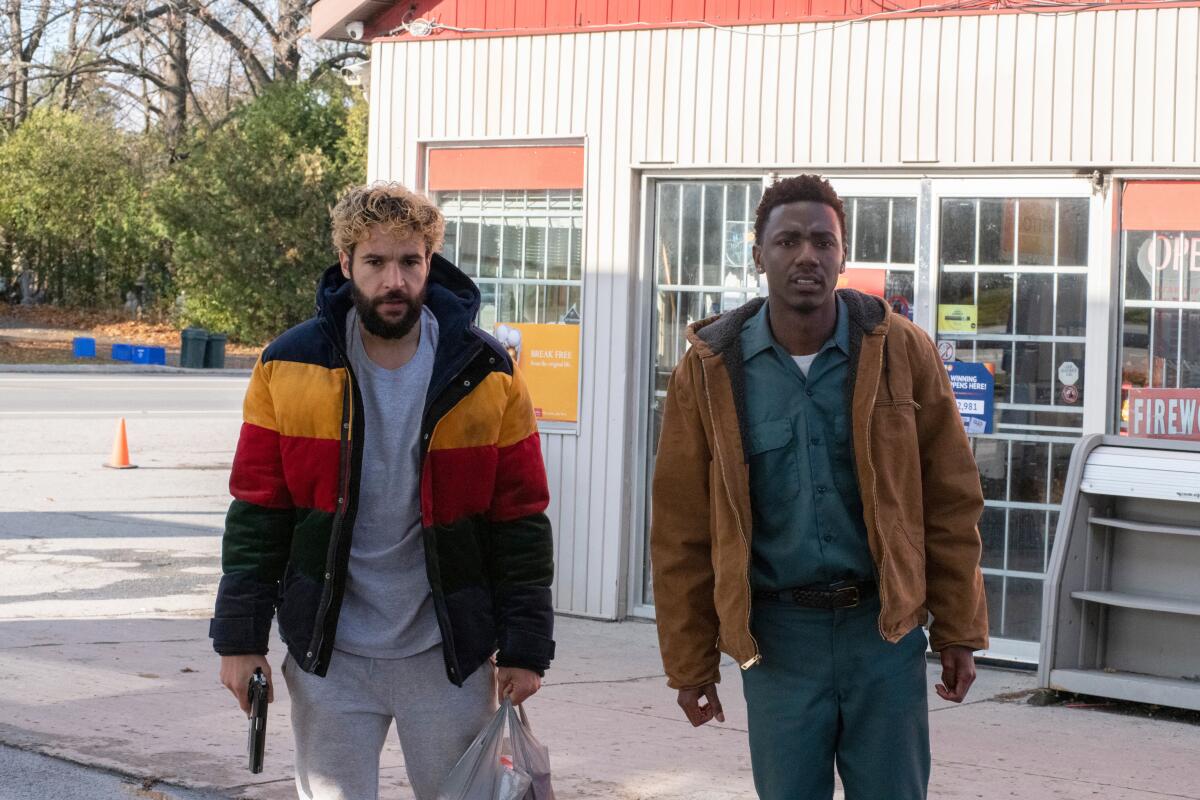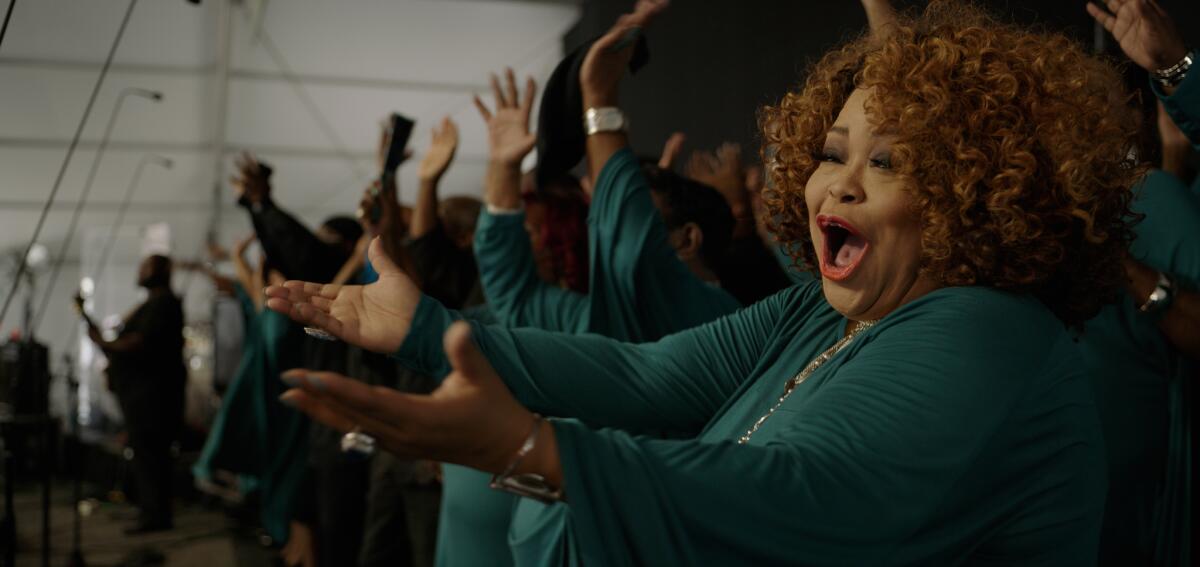Jerrod Carmichael goes dark ‘On the Count of Three’

- Share via
Hello! I’m Sonaiya Kelley, covering for Mark Olsen. Welcome to another edition of your reliable field guide to a world of Only Good Movies.
Only good movies
Get the Indie Focus newsletter, Mark Olsen's weekly guide to the world of cinema.
You may occasionally receive promotional content from the Los Angeles Times.
Black cinema’s “Regeneration.” The Academy Museum of Motion Pictures recently announced an exhibition spotlighting the historic contributions of Black filmmakers. “Regeneration: Black Cinema 1898-1971” will offer a “rigorous and celebratory exploration” of the triumphs and struggles of Black American filmmakers from the dawn of cinema to the civil rights movement. Featuring artists like Oscar Micheaux, Cab Calloway, Josephine Baker, Lena Horne, Harry Belafonte, Ruby Dee, Ossie Davis, Sidney Poitier, Paul Robeson, Melvin Van Peebles and others, the exhibition will open Aug. 21.
Go West. In partnership with the Autry Museum of the American West and the Palm Springs Art Museum, the Pioneertown International Film Festival will be held on Memorial Day weekend. The inaugural festival — delayed by the onset of the pandemic — aims to honor the legacy of westerns by immersing festivalgoers in the cinematic landscape of the Old West. The aptly named Pioneertown, two hours east of Los Angeles near Yucca Valley, was the site of “hundreds upon hundreds” of westerns, including the series “Annie Oakley” and “The Gene Autry Show.” This year’s festival will spotlight the Jason Momoa-led “The Last Manhunt,” which is based on the true story of legendary figure Willie Boy, an Indigenous man who reputedly killed the father of the 16-year-old girl he loved, spawning “a Shakespearean tragedy born of desert dust and gun smoke.” Screenings are at locations in Pioneertown, May 27-29.
“White Men Can’t Jump” in Loz Feliz. OnMay 21 the American Cinematheque will offer a 30th anniversary screening of the sports comedy “White Men Can’t Jump” (1992) at the Los Feliz Theatre as part of its “Watch Local: Windward Ave.” series. The film — starring Woody Harrelson and Wesley Snipes as a pair of L.A. basketball hustlers — is the latest ’90s IP to receive the reboot treatment. It was recently announced that rapper Jack Harlow would make his acting debut opposite “Power” alum Sinqua Walls in a remake for 20th Century Studios.
Enjoying this newsletter? Consider subscribing to the Los Angeles Times
Your support helps us deliver the news that matters most. Become a subscriber.
‘On the Count of Three’
Jerrod Carmichael makes his directorial debut with “On the Count of Three,” a dark comedy about a pair of friends who make a suicide pact and how they spend the last day of their lives. Carmichael stars opposite “Girls” alum Christopher Abbott in the 2021 Sundance selection, now playing at downtown L.A.’s Alamo Drafthouse and available on video-on-demand.
I spoke to the comedian, who recently came out as gay in his moving HBO special “Rothaniel,” about the current climate of comedy, making a movie about depression and feeling a personal connection to the material.
“I know probably the big question would be, ‘Was I suicidal?’” he said over lunch in Santa Monica. “And I wasn’t. I wasn’t, thankfully. But there was this kind of nagging sense of hopelessness that I was dealing with that the script just felt like, ‘Yeah, this is Val.’ I actually named the character after my sister who dealt with depression.”
For Tribune News Service, Katie Walsh wrote, “While it’s a lot of action for a single day, ‘On the Count of Three’ is a fairly simple, resonant story about the power of friendship, rendered with bleakly absurdist humor. The film is very funny and very dark, illustrating the comedic catharsis that can offer relief from inner torment.”
For AP News, Jocelyn Noveck wrote, “Not surprisingly, Carmichael proves a director who is nothing if not confident and comfortable with the uncomfortable. He keeps the action moving — at a few moments, the film even feels like an action pic. A climactic scene has an apocalyptic feel and harks back visually to one of the most famous buddy films of American cinema, though the buddies were named Thelma and Louise.”
For the New York Times, A.O. Scott wrote, “What keeps ‘On the Count of Three’ interesting isn’t the pile of back story revelations and contrived plot twists, but Carmichael and Abbott, who inhabit their roles with sensitivity and realness, mostly avoiding the traps of swagger and self-pity that might threaten a movie about two sad guys with guns.”
For Entertainment Weekly, Leah Greenblatt wrote, “The script is steeped in a sort of slouchy Millennial wit, both ruthless and almost pathologically detached. But Val and Kevin aren’t just cool-kid vessels of 21st-century apathy; they’re weird and funny and vulnerable and sad. And even as the story picks up speed and velocity, their choices rattling inevitably towards a climax neither can walk back from, ‘Three’ supplies its own sideways version of the thing that’s eluded its two leads for too long: hope, and a reason to care.”

‘Pleasure’
Swedish director Ninja Thyberg’s feature debut, “Pleasure,” casts a critical eye on the adult film industry. Newcomer Sofia Kappel stars as industry newbie Bella Cherry, a porn performer determined to ascend the ranks as quickly as she can. The 2021 Sundance selection, which is unrated, is now playing in limited release, including the Landmark Nuart, West Los Angeles.
I spoke to Thyberg for a story that will be publishing soon about her intention behind casting a lens on porn. “I wanted to use a female gaze to expose the male gaze, and porn is the essence of the male gaze because almost all heterosexual porn is made from the male perspective,” she said. “Porn is just mirroring our culture and our society. The content is based on what people are searching for. Sex is so taboo, and there’s so much guilt and shame around it, and then we project that onto the people performing [who are] using their bodies to satisfy our sexual desires. I think that’s very unfair.”
For Thrillist, Esther Zuckerman wrote, “Though ‘Pleasure’ is extraordinarily explicit ... Thyberg is more interested in the mechanisms of porn than the feelings it elicits.... Despite the dirtiness of the content, Thyberg infuses ‘Pleasure’ with an antiseptic quality that counters all of the bodily fluids. A coldness consumes the movie. Like Bella, you become numb watching it, and that’s what makes it all the more haunting.”
For Paste, Natalia Keogan wrote, “The writer/director’s observations are unvarnished and exact, detailing the nuances of one of America’s greatest cultural tenets while adhering to an admittedly familiar cinematic premise of a rising star in a tumultuous career. What’s so original about the film though is its assertion that performing on a porn set isn’t an idealized fantasy or a one-way ticket to self-abasement — it’s simply work. And like all workplaces under capitalism, these workers are under-paid, under-valued and under-protected.”
For IndieWire, David Ehrlich — who calls ‘Pleasure’ “the most honest film anyone has made about the modern porn industry” — wrote, “For all of its appropriately naked thoughts about female agency in an industry that depends on the commodification of female bodies, ‘Pleasure’ feels more like an NC-17 riff on ‘The Devil Wears Prada’ than it does an unlubricated lecture about the inherent misogyny that keeps the masturbation business cranking along.”
For the Hollywood Reporter, Leslie Felperin wrote, “Thyberg switchbacks between humor and humiliation with unsettling abruptness, but withholds judgment of the characters’ choices to create an ethical Rorschach test, prompting reactions that may be more revealing than the film itself.”
For Jezebel, Rich Juzwiak wrote, “Astonishingly audacious and astoundingly responsible, ‘Pleasure’… is routinely explicit ... and frequently brutal.... ‘Pleasure’ makes a subtle but undeniable point about patriarchy’s ripple effect and how power in capitalism almost certainly involves the subjugation of others.”

‘Jazz Fest: A New Orleans Story’
A feature documentary from Sony Pictures Classics, “Jazz Fest: A New Orleans Story,” celebrates the 50th anniversary of the New Orleans Jazz & Heritage Festival, an annual cultural event that some consider America’s greatest festival. The documentary — co-directed by Frank Marshall and Ryan Suffern — combines archival footage, live performances and interviews to spotlight the music, arts, crafts and cuisine of the Big Easy and elsewhere in Louisiana. The film is now playing in limited release, including the Landmark, West Los Angeles; and AMC the Grove, Los Angeles.
For The Times, Robert Abele wrote, “As a playlist shuffle flecked with history and feeling, archival mixing with snappy testimonials and concert footage, it’s solidly engaging, but more variety show than something richly-bone deep (the way ‘Summer of Soul’ reinvigorated this doc genre).”
For Variety, Joe Leydon wrote, “If there’s anything to complain about ‘Jazz Fest: A New Orleans Story,’ it’s the brevity of the film, the obvious winnowing of the 2019 artist lineup and the frequent interruption of performances by interviews. To paraphrase an admonition from a classic Rolling Stones album: This movie should be played real loud. And in venues where people can, if they choose, get up and dance.”
For the Wrap, Steve Pond wrote, “Just like at the festival, you see a lot and miss a lot in the film, and you can bask in the aura of a city where, jazz singer Gregory Porter says in the film, ‘The air is thick, not just with humidity. It’s thick with culture.’”
For the New York Times, Glenn Kenny wrote, “As has been demonstrated in films as wide-ranging as ‘Monterey Pop,’ ‘Woodstock’ and ‘Summer of Soul,’ music festivals can’t help but get part of their vibe from their settings. As musicians from all over the world testify in ‘Jazz Fest,’ the Louisiana city’s annual jazz festival has an irreproducible flavor because it happens in the cradle of American music.”
Only good movies
Get the Indie Focus newsletter, Mark Olsen's weekly guide to the world of cinema.
You may occasionally receive promotional content from the Los Angeles Times.




